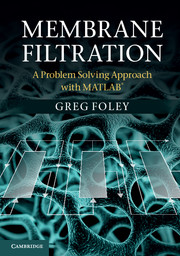Book contents
- Frontmatter
- Dedication
- Contents
- Preface
- Abbreviations
- 1 Introduction to membrane filtration of liquids
- 2 Dead-end filtration
- 3 Crossflow microfiltration
- 4 Ultrafiltration flux theories
- 5 Ultrafiltration process analysis and design at the limiting flux
- 6 Diafiltration at the limiting flux
- 7 Ultrafiltration and diafiltration with incomplete rejection
- 8 The osmotic pressure model applied to ultrafiltration and diafiltration
- 9 Reverse osmosis and nanofiltration
- 10 Membrane fouling
- Appendix Mathematical and computational background
- Index
- References
5 - Ultrafiltration process analysis and design at the limiting flux
Published online by Cambridge University Press: 05 July 2013
- Frontmatter
- Dedication
- Contents
- Preface
- Abbreviations
- 1 Introduction to membrane filtration of liquids
- 2 Dead-end filtration
- 3 Crossflow microfiltration
- 4 Ultrafiltration flux theories
- 5 Ultrafiltration process analysis and design at the limiting flux
- 6 Diafiltration at the limiting flux
- 7 Ultrafiltration and diafiltration with incomplete rejection
- 8 The osmotic pressure model applied to ultrafiltration and diafiltration
- 9 Reverse osmosis and nanofiltration
- 10 Membrane fouling
- Appendix Mathematical and computational background
- Index
- References
Summary
Introduction
In this chapter, mathematical models for analysis, design and optimisation of a variety of continuous, batch and fed-batch UF systems are developed. In all cases the system is assumed to be operating under limiting flux conditions, i.e., Eq. 4.22 applies. It should be recalled that this equation implies complete rejection of the solute. It is seen that, despite the relative simplicity of the models, the presence of the logarithmic term in the flux expression requires one to routinely use numerical techniques to solve the model equations. In addition, it is shown how a graphical method can be useful for certain types of calculations and also it is demonstrated that by employing special functions, numerical solution can be avoided in solving certain batch and continuous problems.
In the next section, continuous feed-and-bleed systems are examined, where the basic computational problem is to solve systems of non-linear algebraic equations (NLAEs). First, process analysis calculations are examined where the goal is to calculate the exit concentration for a given system. In process design calculations, the required area for a given process specification is computed. In process optimisation calculations, the problem of how to minimise the required area in multi-stage systems is examined. Subsequent sections examine batch, fed-batch and single pass continuous systems.
- Type
- Chapter
- Information
- Membrane FiltrationA Problem Solving Approach with MATLAB, pp. 120 - 151Publisher: Cambridge University PressPrint publication year: 2013



